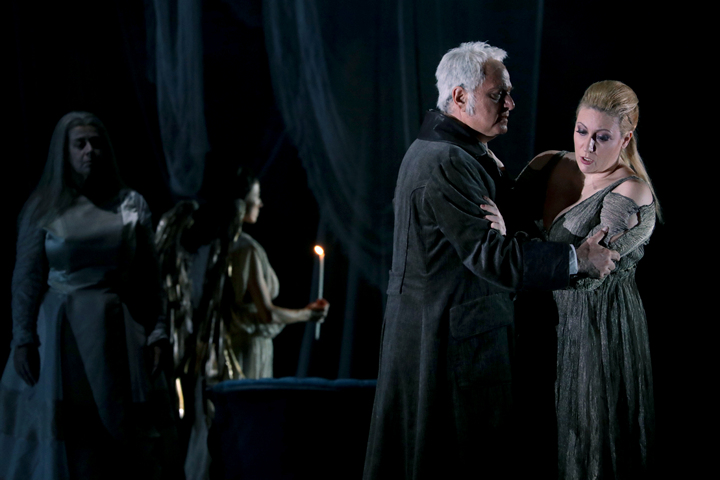| Opera Reviews | 18 June 2024 |
A passionate and memorable La Giocondaby Silvia Luraghi |
|
Ponchielli: La Gioconda |
|

Roberto Frontali (Barnaba), Saioa Hernandez (La Gioconda)
|
|
|
After a 25 years’ absence Amilcare Ponchielli’s La Gioconda is back at La Scala in a new production directed by Davide Livermore, which successfully managed to provide a convincing setting for the often inconsistent, or even absurd libretto. In collaboration with set designer Giò Forma and video designer D-WOK, the director staged the action in a dreamy Venice, which he described as inspired by French cartoonist Moebius’ Venise Celeste and Fellini’s Casanova. Some architectural elements wrapped in white veils, a narrow bridge, canals steaming with fog created a suspended atmosphere, where even the main characters’ exalted passions gained credibility. I found especially impressive the second act, with the high bow of Enzo Grimaldo’s ship entering from the left side to occupy most of the stage in the darkness. In the third act, a long staircase stands at the center of Ca’ d’Oro palace and offers a background to the famous ballet “Dance of hours”. The fourth act near the dungeon where Enzo is held prisoner is dominated by the winged lion of Venice. Though not frequently performed, Gioconda features quite a few very popular arias, known to most opera lovers, and calls for a cast of powerful voices. Assembling such a cast for a seldom performed opera is not an easy task, as the number of singers who have it in their repertoire is limited. The company had to face some unforeseen difficulties when soprano Sonya Yoncheva cancelled her appearance in the title role two weeks before opening night, and was replaced by Saioa Hernández and Irina Churilova. Then, tenor Fabio Sartori, who should have sung the role of Enzo Grimaldo, also cancelled just before the dress rehearsal and was replaced at the very last moment by Stefano La Colla. Saioa Hernández, who sang on opening night, started with some uncertainty in the first act but quickly took hold of the situation and gained enough momentum to dominate the score apparently without effort. Stefano La Colla in his turn was vocally very compelling, though somewhat stiff in acting. His voice is not the typical spinto tenor one would expect for this role, but still the singer was able to mold it to meet all the demands of the score. Also very good was mezzo Daniela Barcellona in the role of Enzo’s lover Laura Adorno, and the confrontation between her and Gioconda in the second act turned out to be one of the highlights of the performance. As her husband Alvise Badoèro, baritone Erwin Schrott sang with his usual taste, displaying a well tuned, handsomely colored voice. Mezzo Anna Maria Chiuri was Gioconda’s mother La Cieca, a character that she rendered with measure and grace, with some delicate sounds in her voice, and without running the risk of overacting. Baritone Roberto Frontali in the role of the villain Bernaba was somewhat disappointing if one expected the character to show common features with later operatic villains such as Iago and Scarpia. Choreographer Frédéric Olivieri took care of the Regata in the first act and the “Dance of Hours” in the third, and directed with mixed results members of La Scala dance academy. The chorus directed by chorus master Alberto Malazzi sang flawlessly as usual, and contributed to the success of the performance. The orchestra was conducted by Frédéric Chaslin, who provided a secure, if not especially insightful reading. At opening night, the theater was almost sold out, with an international audience partly consisting of the numerous tourists that are flooding Milan during design week. The performance was successful with cheers for everyone and some dissatisfaction directed to the conductor.
|
|
| Text ©
Silvia Luraghi Photo Brescia e Amisano © Teatro alla Scala |
|







